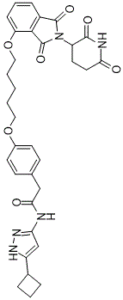CDK9-PROTAC (PROTAC CDK9 Degrader-1) is a novel, potent and selective CDK9 (Cyclin-dependent kinase 9) degrader. CDK9-PROTAC is a heterobifunctional small molecule proteolysis targeting chimera (PROTAC) that can degrade CDK9 through proteasomal activity mediated by cereblon (CRBN). A member of the cyclin-dependent protein kinase (CDK) family, CDK9 is responsible for the transcriptional elongation of multiple target genes. There is widespread expression of CDK9, which has been linked to several cancers, including those of the pancreas, prostate, and breast. CDK9-PROTAC selectively degrades CDK9 in HCT116 cells, leaving other members of the CDK family intact. This is the first instance of a PROTAC that only breaks down CDK9.
Physicochemical Properties
| Molecular Formula | C33H35N5O7 |
| Molecular Weight | 613.660308122635 |
| Exact Mass | 613.25 |
| Elemental Analysis | C, 64.59; H, 5.75; N, 11.41; O, 18.25 |
| CAS # | 2118356-96-8 |
| Related CAS # | 2118356-96-8; |
| PubChem CID | 132472236 |
| Appearance | White to off-white solid powder |
| LogP | 3.4 |
| Hydrogen Bond Donor Count | 3 |
| Hydrogen Bond Acceptor Count | 8 |
| Rotatable Bond Count | 13 |
| Heavy Atom Count | 45 |
| Complexity | 1110 |
| Defined Atom Stereocenter Count | 0 |
| InChi Key | WCEHIDWONYOKOJ-UHFFFAOYSA-N |
| InChi Code | InChI=1S/C33H35N5O7/c39-28-15-14-25(31(41)35-28)38-32(42)23-8-5-9-26(30(23)33(38)43)45-17-3-1-2-16-44-22-12-10-20(11-13-22)18-29(40)34-27-19-24(36-37-27)21-6-4-7-21/h5,8-13,19,21,25H,1-4,6-7,14-18H2,(H,35,39,41)(H2,34,36,37,40) |
| Chemical Name | N-(5-cyclobutyl-1H-pyrazol-3-yl)-2-[4-[5-[2-(2,6-dioxopiperidin-3-yl)-1,3-dioxoisoindol-4-yl]oxypentoxy]phenyl]acetamide |
| Synonyms | PROTAC CDK9 Degrader-1; PROTAC CDK9 Degrader1; PROTAC CDK9 Degrader 1; CDK9PROTAC; CDK9 PROTAC; CDK9-PROTAC |
| HS Tariff Code | 2934.99.03.00 |
| Storage |
Powder-20°C 3 years 4°C 2 years In solvent -80°C 6 months -20°C 1 month |
| Shipping Condition | Room temperature (This product is stable at ambient temperature for a few days during ordinary shipping and time spent in Customs) |
Biological Activity
| Targets | CDK9 |
| ln Vitro | In a dose-dependent manner, PROTAC CDK9 Degrader-1 (Compound 3; 2.5–20 μM; 6 hours) breaks down CDK9 in HCT116 cells [1]. |
| Cell Assay |
Western Blot Analysis[1] Cell Types: HCT116 Cell Tested Concentrations: 2.5, 5, 10 and 20μM Incubation Duration: 6 hrs (hours) Experimental Results: CDK9 was degraded in a dose-dependent manner. |
| References |
[1]. Chemically induced degradation of CDK9 by a proteolysis targeting chimera (PROTAC). Chem Commun (Camb). 2017 Jul 4;53(54):7577-7580. |
Solubility Data
| Solubility (In Vitro) | DMSO: ≥ 104 mg/mL (~169.5 mM) |
| Solubility (In Vivo) |
Solubility in Formulation 1: ≥ 2.5 mg/mL (4.07 mM) (saturation unknown) in 10% DMSO + 40% PEG300 + 5% Tween80 + 45% Saline (add these co-solvents sequentially from left to right, and one by one), clear solution. For example, if 1 mL of working solution is to be prepared, you can add 100 μL of 25.0 mg/mL clear DMSO stock solution to 400 μL PEG300 and mix evenly; then add 50 μL Tween-80 to the above solution and mix evenly; then add 450 μL normal saline to adjust the volume to 1 mL. Preparation of saline: Dissolve 0.9 g of sodium chloride in 100 mL ddH₂ O to obtain a clear solution. Solubility in Formulation 2: ≥ 2.5 mg/mL (4.07 mM) (saturation unknown) in 10% DMSO + 90% Corn Oil (add these co-solvents sequentially from left to right, and one by one), clear solution. For example, if 1 mL of working solution is to be prepared, you can add 100 μL of 25.0 mg/mL clear DMSO stock solution to 900 μL of corn oil and mix evenly. (Please use freshly prepared in vivo formulations for optimal results.) |
| Preparing Stock Solutions | 1 mg | 5 mg | 10 mg | |
| 1 mM | 1.6296 mL | 8.1478 mL | 16.2957 mL | |
| 5 mM | 0.3259 mL | 1.6296 mL | 3.2591 mL | |
| 10 mM | 0.1630 mL | 0.8148 mL | 1.6296 mL |
